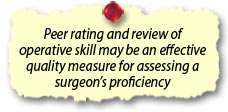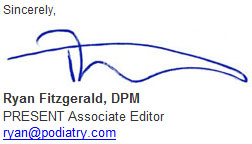This morning, I found myself reading an article in the New York Times regarding a recently published study in the New England Journal of Medicine about the importance of operative skill and its relationship to complication rates following bariatric surgery. I would like to share it with you in the hopes that we can all benefit from a shared moment of introspection. As surgeons and clinicians, we routinely seek out  opportunities to maximize the quality and efficiency of the care that we render – it is ingrained in us from our first patient encounters as third year students and it continues throughout our residency training and into our practice careers. However, sometimes it is important for us individually (and collectively) to take a step back and critically evaluate. opportunities to maximize the quality and efficiency of the care that we render – it is ingrained in us from our first patient encounters as third year students and it continues throughout our residency training and into our practice careers. However, sometimes it is important for us individually (and collectively) to take a step back and critically evaluate.
In this study, researchers in collaboration with the Michigan Bariatric Surgery Collaborative (BSC) videoed cases performed by twenty unnamed bariatric surgeons who were members of the BSC. The researchers then had those videotapes reviewed by surgeon-experts, who then ranked the surgeons based upon the dexterity and precision demonstrated by each surgeon in the case, as well as the operative time for the procedure and the general flow of the procedure. To reduce the risk of bias and to confirm that rankings remained consistent, researchers had several groups of surgeon-experts review and evaluate the tapes.

Surprisingly, researchers found that there were significant variations in operative skill via this peer rating amongst the practicing surgeons in this study. Researchers reviewed the post-operative complication rates among the twenty surgeons included in the study and found that surgeons in the bottom quartile demonstrated a higher mortality rates than top-ranked surgeons and the lower ranked surgeons took 40% more time to complete the same operation than those that were ranked higher.1 The authors concluded that greater technical skill was associated with fewer post-operative complications, lower rates of reoperation, readmission, and visits to the emergency department.1

That makes sense, right? It seems almost too obvious! However, this study is the first to provide empirical data to describe the relationship between technical skill and post-operative outcomes. What does this mean for us as surgeons? Clearly, we need to maintain a focus on pursuing and sustaining the highest level of operative skill that we can attain both during our residency training and into our practice careers. This need, to maintain our skill-set, does not diminish in any way upon residency graduation. Indeed, perhaps the further one gets away from his training, the more important seeking out opportunities to hone one’s skillset becomes.
 While this study provides a cursory view of what the authors describe as “that-which-could-not-be-named,”1 it does suggest that peer rating and review of operative skill may be an effective quality measure for assessing a surgeon’s proficiency, and this provides an interesting avenue for further research as well as raises some interesting questions. While this study provides a cursory view of what the authors describe as “that-which-could-not-be-named,”1 it does suggest that peer rating and review of operative skill may be an effective quality measure for assessing a surgeon’s proficiency, and this provides an interesting avenue for further research as well as raises some interesting questions.
At the conclusion of the article, I found myself sitting at my desk considering my own surgical skill-set, and remembering the various pearls that I’ve learned throughout my time in residency training and while in practice. You will learn from everything, if you’re paying attention.
How can we both be better?
It is necessary that each of us truly consider our strengths as well as our weaknesses, and to seek out those opportunities to practice and hone our skills to the very best of our ability. We’ll never be perfect, but practice WILL make us better.

All opinions expressed are my own and do not necessarily reflect those of my employer.
Reference
- Birkmeyer, JD et al. Surgical skill and complication rates after bariatric surgery. N Engl J Med. 2013:369(15):1434-1442.
Get a steady stream of all the NEW PRESENT Podiatry
eLearning by becoming our Facebook Fan.
Effective eLearning and a Colleague Network await you. |
 |
This ezine was made possible through the support of our sponsors: |
|